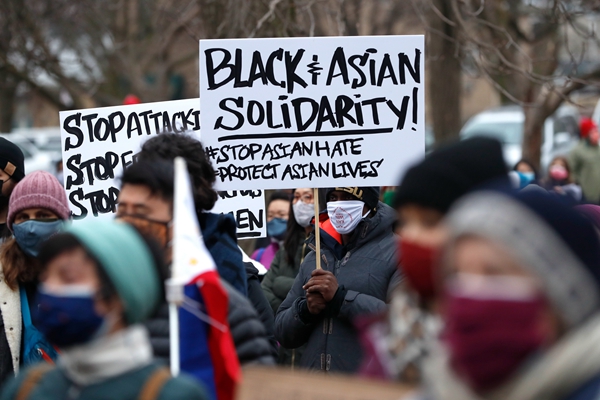Strangers in their own land


"At elementary school the kids said that the delicious food my parents had packed for me-from fried rice and noodles to string bean and shrimp-was smelly," she says. "For a very long time I insisted that my parents pack me only ham sandwiches."
Similar experiences have befallen Katherine Lai, 15, who recalls attending "a predominantly Caucasian school" and being told by her classmates that her food was disgusting.
"Kids would run around screaming, 'Chinese, Japanese, I like cheese,' while pulling back their eyes on the playground. What they did is still ingrained in me, even after 10 years."
In a document accompanying the open letter to the mayor and schools chancellor, both Lai and Tan argued forcefully for the need for Asian American history education, joined by a couple of dozen others between the age of 12 and 15.
"People telling us to 'go back to your country' as if we are less American than them," wrote 14-year-old Mikayla Lin, whose parents migrated from China to the US before she was born.
"Shock and confusion" have hit the boys and girls hard since the start of the pandemic, said Ting Yu, mother of Aiden Tan and his 12-year-old sister Samantha Tan.
"On one hand, they, who consider themselves Americans, have been repeatedly told that they don't belong; on the other hand, their parents, who have been wishing them to learn about Chinese culture and tradition, suddenly warn them against identifying themselves as ethnic Chinese in public, out of concern for their safety," said Yu, a physical therapist who came to the US from China at the age of 14. Yu, one of the five parents behind the proposal, was responsible for collecting students' views, and she did so mostly among those who are on the same debating team as her own children.
"I don't do debate myself but I'm passionate about it because it raises social and political awareness and cultivates leadership, areas in which we must train our children if we are serious about heralding changes in education and elsewhere," Yu says.
Among those she has in mind are Grace Meng, a member of the US House of Representatives, and John Liu, a New York state senator. Both are of Chinese descent.
On October 5 last year Meng, first vice chairman of the US Congressional Asian Pacific American Caucus, introduced in the House of Representatives the Teaching Asian Pacific American History Act. "The announcement... comes on this day, 42 years ago, when president Jimmy Carter signed a joint resolution designating the annual celebration of Asian Pacific American Heritage Week," Meng's office said. Sadly, Heritage Week, which was later extended to a month under President George W. H. Bush in 1990 and is celebrated every May, has been largely "geared toward festivals and fairs", Yu says.
Meng was able to celebrate a victory last week when the federal Hate Crimes Act, of which she was a co-sponsor, became law. It aims to make the reporting of hate crimes more accessible at local and state levels by boosting public outreach and ensuring reporting resources are available online in many languages.
On April 26, the same day the parents submitted their letter, Liu's office announced that he had introduced legislation "requiring New York state public elementary and high schools to provide instruction in the history and civic impact of Asian Americans".
That "civic impact" was made when Wong Kim Ark, who was born in San Francisco in 1873, challenged the US government in court for its refusal to recognize his citizenship. In a landmark decision, the US Supreme Court upheld Ark's request and established the rule of "birthright citizenship" for those who came after him.
Yiatin Chu, who migrated to the US with her Chinese parents at the age of 9, learned about it last year.
"Coming here in the 70s and 80s, watching Sesame Street and learning how to speak English, I had a very different view of what diversity meant as I do now. Melting pot as a concept was definitely more about assimilation (than understanding and celebrating one's own cultural tradition and history)," said the mother-of-two.
In the US, Chu's parents, an engineer and a schoolteacher in Taiwan, were reduced to doing "menial tasks". Yet the mother, while she was not learning English or "stringing beads into necklaces for 5 cents a strand", still found time to teach Chu Chinese, as well as bits and pieces of ancient Chinese history. Later in college, Chu took an elective on 20th-century China which, she says, probably not surprisingly, cast the country mostly in negative light.
"All along the way, I never got to learn Chinese American history," she says.
Then came her belated first lesson in 2019, when a fellow Brooklyn school board member of Chu named Jackie Cody used a racial slur to refer to Asian Americans during an online parent-leader forum.
"To be blunt, certain whites and certain yellow folks ... continue to focus on a very narrow view," Cody wrote at the time. "What they are advocating for is damaging to white and yellow children as well."
"For the first time I researched into what being called yellow means in American history," said Chu, referring to the term yellow peril, used in the 19th and early 20th centuries to vilify Asian American immigrant laborers. Horrendous racial violence, including burning and lynching, were carried out to crush the "sinister yellow peril".




































